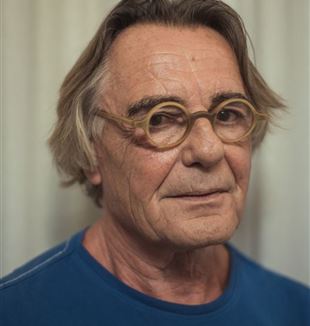
Greece: "My church of migrants"
On the island of Lesvos, Fr. Martin serves an unusual parish, made up mostly of refugees: "I watch them, I listen to them. And their faith strengthens my own."The small Catholic church in Mytilene, dedicated to Our Lady of the Assumption, is almost invisible in the hustle and bustle of the city on the Greek island of Lesvos. Founded in the mid-nineteenth century by Franciscan friars, it now numbers some eighty faithful. But it is an unusual parish. If before, during the summer, it was a destination for curious tourists, for the past few years it has been migrants and volunteers of the many NGOs present who keep it alive. Men and women of different nationalities (Nigerians, Syrians, Eritreans, Sudanese and Afghans above all) and not all of them Christian. Even a few Muslims turn up on Sundays at 11am to listen to the homilies of a Dutch priest who found himself there almost by chance, Fr. Martin Schneeberger.
“I am just a regular priest,” he brushes aside. He does not like to talk about himself, but answers our questions with patience and kindness. "I was ordained in 1986. For almost 20 years I worked as a parish priest in the Netherlands and then I was appointed chaplain at the hospital in Amsterdam. I knew the language of pain well and now I no longer read it in the eyes of the sick people I was caring for, but in those of the migrants in Lesvos to whom I give Communion." It all began in 2015.
"That year, large fluxes of refugees arrived on the island. I was there on holiday and made contact with the small local parish to see if I could be helpful. The parish priest – who did not live on Lesvos, but on the island of Chios – was very happy to have help to celebrate Sunday Mass. During the celebrations I began to meet many migrants. At first it was just little nods of greetings, then some of them began to speak and tell about themselves. I always listened, I listen to everything, because it is my way of embracing them and telling them that God has not abandoned them. They may think that they have been abandoned by the world, but not by God.”
In January 2020, 63-year-old Fr. Martin retired. So he decides to leave for three months for the island, with the idea of lending a hand to the Church and the Kitrinos Healthcare association that works in the refugee camps. The pandemic surprised him and stranded him in Greece for a long time. "At that moment I realised that maybe there was still a task for me and so I decided to stay. Now I live here permanently eight months of the year.”
Right from the start, things were not easy: shortly after his arrival, in fact, a vast arson fire reduced the immense and controversial refugee camp of Moria to ashes. The more than twenty thousand people living there were relocated to reception centres in Athens and Thessaloniki. Not all of them. About two thousand refugees, in fact, remain in Lesvos in extremely difficult conditions, assigned to a new tent city set up a few kilometres north of Mytilene. "Before the fire I used to go to the camp regularly to bring comfort to those poor people, then it was no longer possible.” Fr. Martin, together with some friends from the NGO and the parish, did not give up. And even today their presence is a precious caress for those who arrive in Greece after travelling for months, or years, in inhuman conditions.
Read also - Holy Land: another logic
The parish has been enriched by a choir animated by several migrants, mostly of African and French-speaking origin, who put their voices at the service of all. They also sang before, in their countries of origin, and they brought that little corner of beauty with them to Mytilene. Fr. Martin celebrates Mass, during the week he helps them with the most urgent tasks: legal assistance, fetching basic necessities, buying boarding tickets or figuring out how to apply for residence permits. There are children who have come from afar and are homesick for school, football, friends. Unaccompanied minors, families who split up during the journey and have no idea how to reunite, some elderly people, many women. "Being with them, with each of them, is a great joy and enrichment for me because my faith grows and strengthens. Every morning, I can recognise the face of God in their faces. Faith in the abstract would not be much, with these migrants for me it becomes concrete, very concrete.” He does not feel he is doing anything exceptional: "Sometimes all I can do is listen and be present with small gestures, like a greeting outside Mass, but this too is one of Jesus' commandments: to stand by those who are helpless, showing that they are not alone. That their life is precious.”